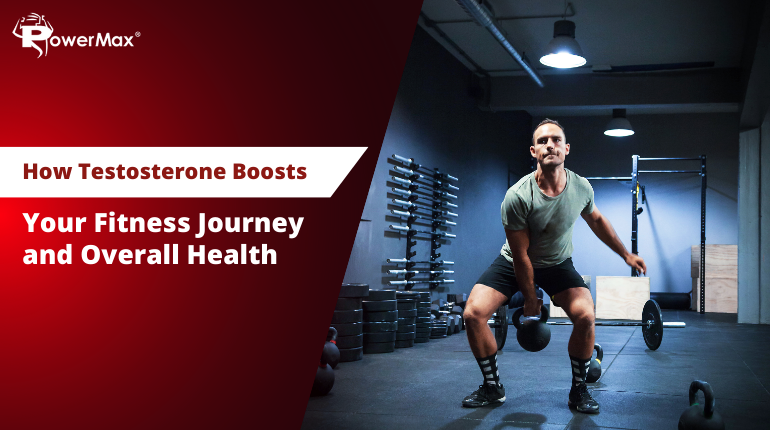How Testosterone Improves Your Path to Optimal Health and Exercise

Often called the "male hormone," testosterone is essential for men's and women's physical and emotional well-being. Though in smaller amounts, this hormone is equally important for women even if it is more plentiful in men. Apart from its obvious impact on sexual health, testosterone is a powerhouse for general well-being and fitness. This page shows how testosterone enhances your general health and speeds up your path of fitness.
What is Testosterone?
Mostly produced in men's testes, testosterone is a steroid hormone also produced in lesser levels in women by the ovaries and adrenal glands. Crucially for developing male reproductive organs, secondary sexual features, and other physiological processes, it falls into the androgen group of hormones.
Men's testosterone levels peak in early adulthood and adolescence then progressively drop with age. Though at smaller amounts, women still need on this hormone for muscle strength, bone density, and sexual health.
The Role of Testosterone in Fitness
1. Muscle Growth and Maintenance
Rising muscular development is one of the most well-known effects of testosterone. Essential for muscle development and repair, testosterone stimulates protein synthesis. Enough testosterone ensures that your body builds and keeps lean muscle correctly whether you lift weights, conduct resistance training, or simply keep active.
Low testosterone can lead to muscle loss, diminished strength, and a slower metabolism, which can impair your fitness progress.
2. Increased Strength
The foundation of fitness is strength, hence testosterone is rather important in improving it. Increased testosterone levels help you to engage more muscle fibers during physical exercise, thereby enabling you to execute more repetitions or raise more weights. This improves performance as well as speeds up strength training program progress.
3. Enhanced Fat Metabolism
By lowering fat mass and increasing lean muscle, testosterone is essential for control of body composition. The body burning fat for energy determines a toned and athletic body, thus it boosts that potential. Conversely, low testosterone can cause greater fat storage, especially around the midsection.
4. Improved Recovery
Consistent progress calls for post-workout recovery. Testosterone speeds muscle recovery by reducing inflammation and promoting cell renewal. Faster recovery enables you train harder and more often without running the danger of overtraining or injury.
5. Boosted Endurance
Though it is generally associated with strength and muscle, testosterone also boosts endurance and stamina. Adequate amounts of testosterone promote red blood cell formation, improving oxygen transport to muscles during activity. This arises from better performance in aerobic and anaerobic exercises.
Testosterone and Overall Health
Beyond simply athleticism, testosterone is very crucial for keeping general health. It looks like this:
1. Bone Health
Bone density is maintained in part by testosterone. Especially in males, as testosterone levels decline with age the risk of osteoporosis and fractures increases. An active lifestyle depends on strong bones, hence testosterone is essential for long-term mobility and health.
2. Heart Health
testosterone directly influences heart health by pushing the synthesis of red blood cells and so preserving circulatory function. Although studies on the link between testosterone and heart disease are still under progress, typically balanced testosterone levels are linked with a better heart and lower risk of cardiac problems.
3. Mood and Mental Health
Reduced cognitive ability, mood swings, and sadness can all follow from low testosterone levels. Conversely, optimal testosterone levels have been linked to improved mental clarity, confidence, and mood. These advantages are priceless for keeping your drive and concentration both in daily life and on your exercise path.
4. Sexual Health
Libido and sexual performance in males as well as women depend on testosterone. Men's erectile dysfunction and reduced sex drive might ensue from low levels. Restoring testosterone levels will help with personal relationships and general wellness.
5. Energy Levels
One often signs of low testosterone is persistent tiredness. Testosterone's increased energy production helps you remain active and maintain a consistent workout program.
Factors Affecting Testosterone Levels
Among the several elements influencing testosterone levels are:
Several factors influence testosterone levels, including:
-
Age: Testosterone levels naturally decline with age.
-
Diet: Poor nutrition, especially diets low in healthy fats and essential vitamins, can reduce testosterone.
-
Stress: Chronic stress increases cortisol, a hormone that suppresses testosterone production.
-
Sleep: Poor sleep quality or insufficient rest can significantly impact testosterone levels.
-
Lifestyle Choices: Smoking, excessive alcohol consumption, and lack of physical activity can lead to decreased testosterone.
Natural Ways to Boost Testosterone
While medical treatments like testosterone replacement therapy (TRT) are available, many prefer natural methods to optimize their levels. Here are some evidence-based strategies:
1. Strength Training
Regular weight training is among the best ways to raise testosterone. Among other compound motions, squats, deadlifts, bench presses increase testosterone production.
2. Healthy Diet
Protein: Supports muscle repair and hormone production.
Healthy Fats: Found in avocados, nuts, and olive oil, these fats are crucial for hormone synthesis.
Micronutrients: Zinc, magnesium, and vitamin D are essential for testosterone production.
3. Adequate Sleep
Aim for 7-9 hours of quality sleep per night. Deep sleep stages are critical for testosterone synthesis.
4. Stress Management
Among the stress-reducing activities you may undertake to promote testosterone creation by lowering cortisol levels are meditate, yoga, or deep breathing exercises.
5. Maintain a Healthy Weight
Extra body weight especially around the abdomen can lower testosterone levels. A balanced diet and consistent exercise can help to maintain weight within optimum range.
6. Avoid Toxins
Limit your contact to various insecticides and environmental toxins including BPA, which is present in plastics, since these might disturb hormone balance.
When to Seek Medical Help
See a healthcare professional if your low testosterone symptoms are severe or if home remedies produce little effects. They can run blood tests to assess your hormone levels; should necessary, they can suggest treatments including testosterone replacement therapy (TRT).
Conclusion
More than just a hormone connected with masculinity, testosterone is something else. Physical fitness, mental health, and general well-being for men and women depend especially on this element. From raising mood and energy levels to promoting muscular building and fat reduction, testosterone is basic in a good, active existence.
Knowing the purpose of testosterone and acting to raise its levels will help you to improve your general quality of life and increase your physical potential. Maintaining ideal testosterone levels is an investment in your long-term health and vitality whether from regular exercise, a healthy diet, or medical intervention.
 India
India UAE
UAE
-thumb.jpg)
-thumb.jpg)
-thumb.jpg)
-thumb.jpg)
-thumb.jpg)


-thumb.jpg)

-thumb.jpg)